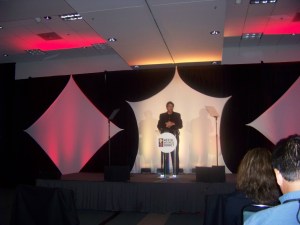
Industry agent Keith Boesky said people told him that the empty hallways were “post apocalyptic.” A telling moment for me: Tom Russo, former G4TV programming head, waved at me from a few hundred yards away, in the empty corridor, and yelled, “Dean, can you see me in the crowd?” John Riccitiello, CEO of Electronic Arts, told the San Francisco Chronicle that “I hate E3 like this,” while Laurent De Toc, a Ubisoft executive, piled on, saying the show was more like a convention for pipe-fitters.
[aditude-amp id="flyingcarpet" targeting='{"env":"staging","page_type":"article","post_id":95418,"post_type":"story","post_chan":"none","tags":null,"ai":false,"category":"none","all_categories":"games,social,","session":"D"}']Even Michael Pachter, an analyst at Wedbush Morgan, interrupted his discussion of game industry stocks for his own mini-tirade. He wrote, “The show was small in scope, and the spectacle of E3 is dead. The Los Angeles Convention Center concourse was as quiet as a college library during summer, with little to attract media attention. The main game display area was similar in size to a school cafeteria (as compared to filling the entire convention center), and the ‘fireworks effect’ of past shows was reserved for the evening parties.”
AI Weekly
The must-read newsletter for AI and Big Data industry written by Khari Johnson, Kyle Wiggers, and Seth Colaner.
Included with VentureBeat Insider and VentureBeat VIP memberships.
“The irony is that we have a cultural revolution, with more people enjoying interactive entertainment than at any other time in our history; the video game industry has never been better,” said Joseph Olin, president of the Academy of Interactive Arts and Sciences. “And you would think that we are going out of business here. We’ve lost the opportunity to stand up on our soap boxes and shout, look at me. The one thing the traditional E3 did was light the place up like a roman candle lit at both ends and focus the world’s media attention on us.”
Gallagher told the San Francisco Chronicle that the association would likely increase the numbers at next year’s show. Holly Rockwood, spokeswoman for EA, said many members of the ESA believe that the show can be improved next year by adding a consumer element.
David Perry, chief creative officer for Acclaim, said that the show was an embarrassment and the industry should open it up to every game developer and publisher in the world in acknowledgment of the industry’s global reach.
But will there be an E3 next year? Dennis McCauley, editor of the Game Politics blog, predicts that the industry will let the show die.
[aditude-amp id="medium1" targeting='{"env":"staging","page_type":"article","post_id":95418,"post_type":"story","post_chan":"none","tags":null,"ai":false,"category":"none","all_categories":"games,social,","session":"D"}']
Pachter wrote that the show is headed for extinction, unless the industry wakes up. Organizers could, for instance, move the show earlier so it doesn’t occur during the “quiet period” for companies reporting their quarterly results.
I have to say that I benefited from the new format. There was less competition from the big-name media outlets for key interviews and networking was more efficient. I didn’t miss a single one-on-one interview, whereas I always missed appointments in the past because it was so hard to navigate the crowds.
I heard similar notions from freelance game journalist Peter Suciu (his post), Dan Amrich, senior editor of the Official Xbox Magazine, Chris Baker of Wired, Rob Smith of the Official PlayStation Magazine, and Mike Snider, a longtime video game writer for USA Today. And those of us who made it into the Rock Band 2 party were thrilled to watch The Who put on a nostalgic concert. But there were a lot of people, game industry CEOs included, whom I normally meet with but were not invited to attend. They couldn’t get in.
“I do sort of feel a tinge of regret that E3 was so scaled down,” Baker wrote in an email. “The old E3 was sort of like the ultimate video game. It had great visuals and audio, what with those three story demo booths and 50 foot video screens. You were navigating through this enormous environment, checking your map and dodging obstacles, trying to choose the best routes and evade dull appointments and maximize your time with games while minimizing your time in transit. Part of me misses the old E3 because it was like a really difficult game, and I’d leveled up to the point where I was kind of good at it. And now those skills are useless.”
[aditude-amp id="medium2" targeting='{"env":"staging","page_type":"article","post_id":95418,"post_type":"story","post_chan":"none","tags":null,"ai":false,"category":"none","all_categories":"games,social,","session":"D"}']
My own thought? They should combine an invitation-only event for journalists and top executives with a paid-event for game industry followers and the general public. That should help pay for the ESA’s own costs so that it doesn’t have to charge its members such high dues (which caused Activision Blizzard, the industry’s biggest company, to drop out of the ESA). A little bit of spectacle will bring the big media back and allow the video game industry to enjoy its own moment on the pedestal. E3 is as much a statement about the clout and the power of the video game industry as it is show for hacks to see games.
VentureBeat's mission is to be a digital town square for technical decision-makers to gain knowledge about transformative enterprise technology and transact. Learn More
